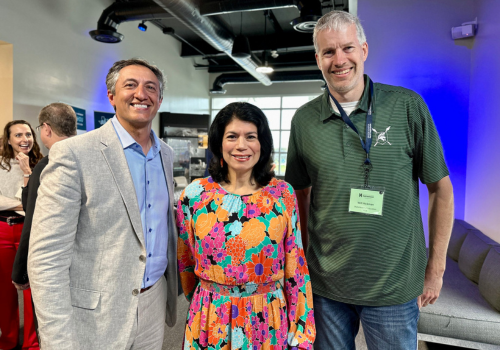Energy Transition and Houston Ship Channel Among Key Topics for D.C. Fly-In
Published Mar 11, 2020 by Sophia Guevara
At the end of February, the Greater Houston Partnership led a delegation of almost 100 business leaders, elected officials and regional partners to Washington D.C. to celebrate Houston and to discuss federal priorities with members of Congress, the Trump administration and agency officials, and other key stakeholders.
Led by Partnership President and CEO Bob Harvey, chaired by Marc Watts, President of the Friedkin Group, Partnership executive leadership and with support from the Partnership's Public Policy Division, the group advanced key federal priorities -- communicating the importance of widening and deepening the Houston Ship Channel and positioning Houston to lead the global energy transition -- among other policy issues.
The federal priorities that the Partnership discussed during the fly-in are available here.
Photos from the Partnership’s D.C. Fly-In are available here.
Washington D.C. Fly-In Highlights
Through meetings on the Hill with offices of members of Congress, meetings with administration and agency officials and through political and policy briefings, the Partnership took an important step forward in positioning Houston in the nation’s Capital.
Investing in Houston Infrastructure: The Houston Ship Channel
- At a briefing, U.S. Secretary of Transportation Elaine Chao highlighted the importance of investing in the nation’s ports.
- The Partnership heard from Congressman Peter DeFazio, Chair of the House Committee on Transportation and Infrastructure. Although not from the Houston region, Chairman DeFazio was well aware of and supportive of the need to widen and deepen the Houston Ship Channel.
- In a meeting on the Hill, House Minority Leader Kevin McCarthy expressed his support for the Houston Ship Channel project.
Houston Leading the Global Energy Transition
- House Minority Leader McCarthy also highlighted federal policy proposals that could support the development and deployment of Carbon Capture, Use, and Storage (CCUS) technology.
- American Petroleum Institute President and CEO, Mike Sommers, discussed policies needed to position American energy to lead the energy transition, including CCUS.
- Partnership executive leadership, members and regional stakeholders discussed the global energy transition, including key tax and legislative issues, with Offices of Members of Congress, including members of the Houston regional congressional delegation.
Infrastructure Policy: Widening and Deepening the Houston Ship Channel
The Partnership started off the fly-in at the U.S. Chamber of Commerce, where U.S. Secretary of Transportation Elaine Chao discussed key federal infrastructure priorities, saying, "We want to build the transportation system of the future." As she highlighted key efforts to address this issue, Secretary Chao said, "Investing in our ports is investing in our prosperity."
The Partnership agrees that investing in our nation’s ports is critical. The Port of Houston and Houston Ship Channel are central to Houston's long-term growth and prosperity. The Houston Ship Channel is the busiest deep-draft waterway in the nation, with as many annual ship calls as the next three largest U.S. ports combined (Los Angeles, Long Beach and New York/New Jersey). The Houston region is home to the largest petrochemical manufacturing complex in the nation, and it is where 27 percent of the U.S. gasoline and 60 percent of aviation fuel is produced.
Simply put, the Houston Ship Channel must be deepened and widened to support two-way traffic, which is necessary to support Houston’s growth and ensure safety in the ship channel. Currently, larger container ships are beginning to call on Houston, and this, combined with greatly increased movements of crude oil and other hydrocarbons, is creating a worsening traffic issue in the channel.
The industry along the Houston Ship Channel has expressed its willingness to fund half of the project, or $500 million of the approximately $1 billion total cost. However, the mechanism and federal authority for facilitating this financing partnership requires further clarification as the U.S. Army Corps of Engineers (USACE) policy was designed for the traditional financing process.
Federal funding would likely come through the annual Energy & Water Development Appropriations bill. The most recent appropriation to complete the current study to expand the ship channel was provided through the FY 2019 Energy & Water Development Appropriations bill.
The Ship Channel Expansion Study is nearly complete as it is in a review period. The USACE’s official recommendation to Congress, the Chief’s Report, will likely be made available to Congress by April 28, 2020.
Partnership executive leadership, members and regional stakeholders discussed the Chief’s report and the importance of including this project in the 2020 Water Resources Development Act (WRDA), which Congress is likely to take up this year, as the Partnership’s delegation met with Offices of Members of Congress, including members of the Houston regional congressional delegation.
This bill is currently being considered in the House Transportation and Infrastructure Committee. The committee includes three members of the region’s congressional delegation, Congresswoman Lizzie Fletcher, Congressman Brian Babin, and Congressman Randy Weber. Members of the Partnership’s fly-in met with representatives from offices of each of these Members of Congress.
Energy Policy: Houston Leading the Energy Transition
Strengthening Houston’s position as the Energy Capital of the World was the second executive priority for the Partnership’s Washington D.C. Fly-In. Through the fly-in, Partnership members and regional stakeholders met with a slate of speakers for policy discussions concerning key energy issues impacting Houston.
Skip Elliot, Administrator of the Pipeline and Hazardous Materials Safety Administration, discussed the safe transportation of energy and shared his insights on ever-strengthening safety.
At the Eisenhower Executive Office Building, Chairman of the Council on Environmental Quality, Mary B. Neumayr, presented her office’s work on energy policy, specifically updates to the National Environmental Policy Act.
Partnership President and CEO, Bob Harvey, held a fireside chat with American Petroleum Institute President and CEO, Mike Sommers. During the conversation, Sommers discussed policies needed to address the challenge of climate change and position American energy to lead the energy transition, including Carbon Capture, Use, and Storage (CCUS).
Harvey and Sommers discussed the National Petroleum Council’s CCUS study and the policy needs to bring the technology to scale. In Houston, the Partnership’s Energy Advisory Committee is reviewing the CCUS study and exploring the policy dimensions of CCUS. The committee will be drawing up solutions at the federal level to ensure the Texas Gulf Coast is positioned as the leader in this promising new technology.
In January, Partnership Chair, Bobby Tudor, Chairman of Tudor, Pickering, Holt & Company, outlined how the Partnership will work to ensure that Houston plays a key role in the global energy transition. With that role comes the recognition that Houston has a responsibility, in coordination with federal partners, to lead the energy transition to a cleaner, more efficient and more sustainable, lower-carbon world.
Tudor’s full remarks are available here.
Through the fly-in, the Partnership demonstrated the Houston business community’s commitment to working alongside Congress and the Trump administration to identify solutions to take on the dual challenge of meeting the world’s energy needs while lowering the world’s carbon footprint.
The Partnership also heard from Federal Energy Regulatory Commission (FERC) Chairman Neil Chatterjee on the key energy issues facing the commission. From managing initiatives ranging from LNG export terminal application processes, enhancing grid reliability and resilience to ensuring new technologies can compete freely in the energy market, FERC leads a significant role in the changing energy landscape. Partnership members appreciated Chairman Chatterjee’s insights as the Partnership draws up federal priorities for supporting the global energy transition.
Partnership executive leadership, members and regional stakeholders discussed the global energy transition further, including key tax and legislative issues, with Offices of Members of Congress, including members of the Houston regional congressional delegation.
Houston in the Nation’s Capitol
The Partnership’s Washington D.C. Fly-In also represented an opportunity for business leaders, elected officials and regional partners to position Houston at the federal level.
The Partnership hosted a “Celebrate Houston” reception with members of Congress, Houston business community leaders and regional partners. Members of Congress, including Senator Ted Cruz, Congresswoman Sylvia Garcia, Congressman Al Green and Congresswoman Sheila Jackson-Lee, offered remarks on federal policies impacting Houston, including the importance of widening and deepening the Houston Ship Channel.
The Partnership also heard from agency officials, leading policy work impacting key sectors of the Houston economy, including the aerospace industry and health care. Jim Bridenstine, Administrator at NASA, gave his outlook on the future of the space industry, and Calder Lynch, Acting Deputy Administrator & Acting Director at the Center for Medicare & Medicaid Services (CMS), provided an update on CMS’s and the Children’s Health Insurance Programs’ key initiatives, which cover some 72 million Americans.
Members of the Partnership’s fly-in also heard a political update from Jake Sherman, senior writer at Politico and co-author of the daily newsletter, Politico Playbook. Before the fly-in drew to a close, Sherman provided an overview of what to expect in the political landscape for 2020, including key developments that could impact Texas.
Overall, through meetings on the Hill with offices of members of Congress, meetings with administration and agency officials and through political and policy briefings, the Partnership took a decisive step forward in positioning Houston in the nation’s Capital.
Learn more about the Partnership's advocacy efforts around priority issues.
 The Houston Report
The Houston Report




















